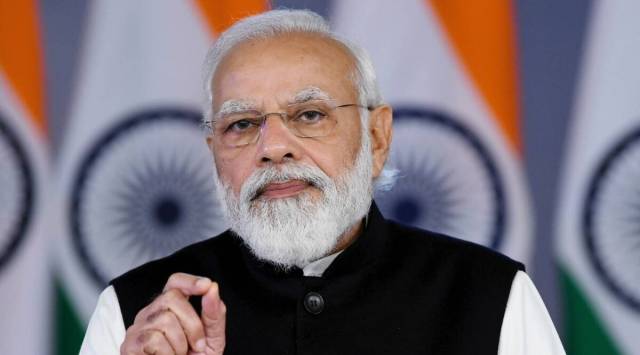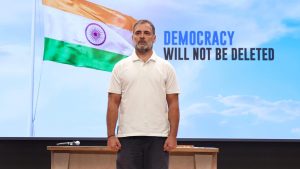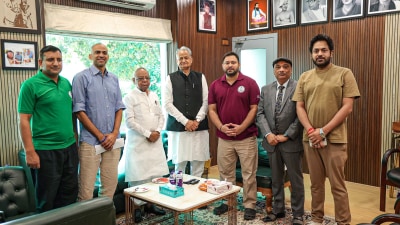On Mann Ki Baat, PM Modi recalls Emergency, says it was a ‘dark period’ in India’s history
PM Modi pointed out that “many books have been written on these atrocities; the punishment meted out by the police and administration”

Describing the days of Emergency as “a dark period in the history of India”, Prime Minister Narendra Modi said Sunday that “supporters of democracy were tortured so much during that time, that even today, it makes the mind tremble”.
In his Mann Ki Baat address — he usually delivers it on the last Sunday of the month but decided to do it earlier because he is travelling to the US next week where, he said, he has a hectic schedule — Modi recalled the imposition of Emergency on June 25, 1975 and the “atrocities” on the “guardians of democracy” in the months that followed.
“India is the mother of democracy. We consider our democratic ideals as paramount, we consider our Constitution as supreme… Therefore, we can never forget June the 25th. This is the very day when Emergency was imposed on our country. It was a dark period in the history of India. Lakhs of people opposed the Emergency with full might,” he said.
“The supporters of democracy were tortured so much during that time, that even today, it makes the mind tremble. Many books have been written on these atrocities; the punishment meted out by the police and administration. I also got the opportunity to write a book named Sangharsh Mein Gujarat at that time,” he said.
“A few days ago, I came across another book written on the Emergency — Torture of Political Prisoners in India. This book, published during the Emergency, describes how, at that time, the government was treating the guardians of democracy most cruelly. There are many case studies in this book, there are many pictures. I wish that today, when we are celebrating the Azadi Ka Amrit Mahotsav, we must also glance at such crimes which endanger the freedom of the country. This will make it easier for today’s young generation to understand the meaning and significance of democracy,” he said.
Referring to cyclone Biparjoy which battered the Gujarat coast a few days ago, Modi praised “the courage and preparedness with which the people of Kutch fought such a dangerous cyclone”. He said “no one has any control over natural calamities, but the strength of disaster management that India has developed over the years is becoming an example today”.
“There is a significant way to combat natural calamities — conservation of nature. These days during monsoon, our responsibility in this direction increases manifold. That is why today the country is making collective efforts through campaigns like Catch the Rain.”
Highlighting water conservation, he mentioned the efforts being made by people like Tulsiram Yadav, the pradhan of Luktara gram panchayat in Banda district of UP. To overcome the water “challenge” in Banda and Bundelkhand regions, Tulsiram, he said, has built more than 40 ponds in the area, taking along with him the people of the village. He said in Hapur district in UP, people have revived an extinct river.
Urging people, especially those in the cities, to learn about the Japanese technique Miyawaki to green an area that’s not fertile, Modi said, “Miyawaki forests spread rapidly and become biodiversity spots in two to three decades. This is now spreading very fast in different parts of India too. Shriman Raafi Ramnath, a teacher from Kerala, changed the scenario of the area with this technique… In the tiny space in this Vidyavanam of Ramnathji, over 450 trees of 115 varieties were planted. His students also help him in their maintenance.”
On the fight against tuberculosis, he said the country has resolved to create a TB-free India by 2025. “The goal is certainly a lofty one. There was a time when, after coming to
know about TB, family members used to turn away, but today TB patients are being helped by making them family members. To eliminate tuberculosis from the root, Nikshay Mitras have taken the lead. A large number of varied social organisations have become Nikshay Mitra in the country. Thousands of people in villages and panchayats have come forward themselves and adopted TB patients. There are many children who have come forward to help TB patients. This public participation is the biggest strength of this campaign. It is due to this participation that today, more than 10 lakh TB patients in the country have been adopted,” he said.
He said “nowadays there is a lot of discussion about Jammu and Kashmir in our country. Sometimes due to rising tourism, at times due to the spectacular events of G20”. He said there was a shortage of milk in Baramulla and people there “took this challenge as an opportunity” by starting dairy farming.
“The women here came to the forefront of this task, such as a sister, Ishrat Nabi. Ishrat, a graduate, has started Mir Sisters Dairy Farm. About 150 litres of milk is being sold every day from their dairy farm. Similarly, one such friend is from Sopore… Wasim Anayat. Wasim has more than two dozen animals and he sells more than 200 litres of milk every day. Another youth, Abid Hussain, is also doing dairy farming. His work is also progressing a lot. Due to the hard work of such people, 5.5 lakh litres of milk is being produced daily in Baramulla. The entire Baramulla is turning into the symbol of a new white revolution. During the last two-and-a-half-three years, more than 500 dairy units have come up here. The dairy industry of Baramulla is a testimony to the fact that every part of our country is full of possibilities,” he said.
He complimented Indian sportspersons and coaches for achievements in international events and said that “behind this success of the country in international events is the hard work of our sportspersons at the national level”.
“This is the real strength of our youth. There are many such sports and competitions, where today, for the first time, India is making her presence felt. For example, in long jump, Shrishankar Murali has won a bronze for the country in a prestigious event like the Paris Diamond League. This is India’s first medal in this competition. One such similar success has been registered by our Under-17 women wrestling team in Kyrgyzstan,” he said.







